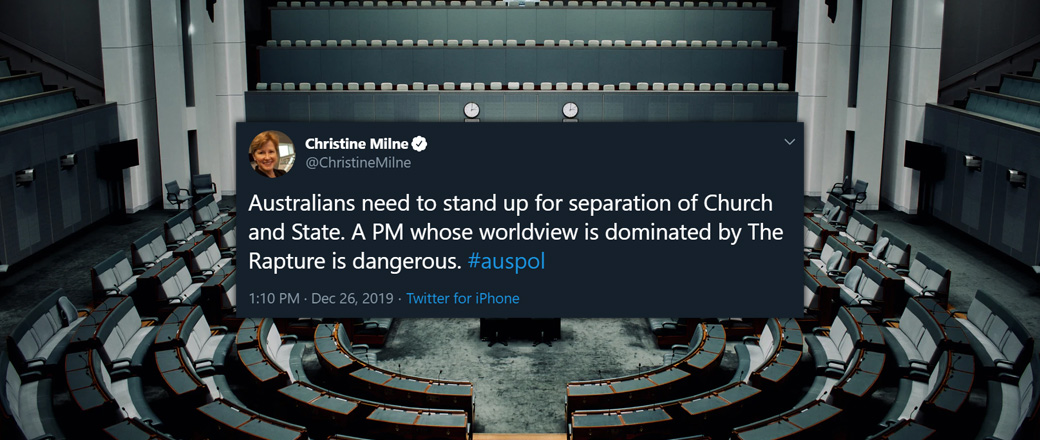Former Greens leader Christine Milne has urged Australians to “stand up for separation of Church and State”, suggesting Christian politicians are “dangerous” and have no place in politics.
In a tweet posted on Boxing Day, the Global Greens Ambassador said: “Australians need to stand up for separation of Church and State. A PM whose worldview is dominated by The Rapture is dangerous.”
Australians need to stand up for separation of Church and State. A PM whose worldview is dominated by The Rapture is dangerous. #auspol
— Christine Milne (@ChristineMilne) December 26, 2019
Is Milne suggesting that Australia has violated the principle of “separation of church and state” by electing a Christian Prime Minister? Is she suggesting that a Christian worldview ought to disqualify a person from politics? Should Christians be denied the right to elect a politician who subscribes to their worldview?
Not only does Milne’s comment demonstrate that she does not understand what “separation of church and state” means, but it also sounds as though she wants the state to dictate which religious worldviews should disqualify a person from public office.
But as Dave Pellowe, founder of Church and State Summit, pointed out, the Constitution specifically prohibits applying religious tests for public office. According to Section 116 of the Constitution of Australia:
The Commonwealth shall not make any law for establishing any religion, or for imposing any religious observance, or for prohibiting the free exercise of any religion, and no religious test shall be required as a qualification for any office or public trust under the Commonwealth.
“That means ticking the religion box is IRRELEVANT by law for political candidates,” Pellowe tweeted in response to Milne. “Are you proposing a referendum, or just dog-whistling for all the Christophobic bigots?”
In his maiden speech in Parliament on February 14, 2008, Prime Minister Scott Morrison rightly said: “Australia is not a secular country, it is a free country. This is a nation where you have the freedom to follow any belief system you choose.
“Secularism is just one. It has no greater claim than any other in our society… The constitution provides freedom of religion, not freedom from religion.”
As Dr Stephen Chavura has rightly noted, there’s a common misconception that separation of church and state means religion should not have any influence on politics or legislation.
“Separation of church and state is about the power of one institution over another — of the government over the churches and over the people’s religious beliefs,” Dr Chavura said.
“Separation of religion and politics is the idea that religion shouldn’t in any way influence politics, and that’s probably not even possible — unless you want to go to North Korea or Communist China.”
Even then, in some sense or another, every human being is essentially “religious”. Whether we subscribe to a particular religion or not, every human being holds to certain values and these values imply a rationale.
It makes no difference if someone accepts the values of an organised religion or decides to invent his own. In fact, inventing your own values on the basis of nothing more than a personal whim or opinion is about as arbitrary and dangerous as it gets.























